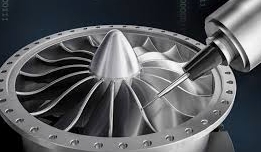

Inquiry

Project Review

Machining

Quality Control

Pass/Fail

Delivery
Innovation in flight technology has accelerated dramatically over the past few decades, enabling safer, faster, and more efficient air and space travel. Behind much of this progress lies a fundamental and often invisible force: aerospace precision machining. This highly specialized manufacturing process enables the production of ultra-precise components that are essential for modern aircraft, spacecraft, and advanced aerospace systems.
What Is Aerospace Precision Machining?

Aerospace precision machining involves the use of advanced CNC (Computer Numerical Control) equipment and ultra-precise tools to manufacture metal and composite components to incredibly tight tolerances—often within microns. These parts must meet exacting standards set by aerospace regulatory bodies such as the FAA, EASA, and NASA, given the critical nature of aerospace applications.
Materials used often include titanium, aluminum alloys, stainless steel, Inconel, and other high-performance metals that can withstand extreme temperatures, pressure changes, and dynamic forces experienced during flight.
The Link Between Precision Machining and Flight Innovation
1. Enabling Lightweight Design Without Sacrificing Strength
One of the biggest challenges in aerospace engineering is reducing weight while maintaining structural integrity. Precision machining allows manufacturers to produce complex, weight-optimized geometries that are impossible to achieve through traditional manufacturing methods. Lighter aircraft consume less fuel, reduce emissions, and increase payload capacity—key drivers in both commercial and defense aviation.
2. Supporting Complex Component Integration
Modern aircraft feature integrated systems that combine mechanical, electrical, and software-driven functions. Components such as engine housings, turbine blades, sensor mounts, and avionics enclosures must be manufactured with extreme accuracy to ensure seamless integration and operation. Aerospace precision machining provides the tolerances and repeatability necessary for such integration.
3. Fuel Efficiency and Performance
Precision-machined turbine blades and engine parts directly influence the performance and efficiency of jet engines. A small imperfection in the curvature of a blade or the alignment of a housing can lead to performance loss or even catastrophic failure. By ensuring flawless part geometry, precision machining plays a direct role in improving thrust, reducing fuel consumption, and lowering maintenance costs.
4. Enabling Advanced Materials and Technologies
Aerospace precision machining has evolved to handle cutting-edge materials like carbon fiber composites and superalloys. These materials enable better thermal resistance, lower weight, and higher strength. Advanced machining technologies such as 5-axis milling and wire EDM (electrical discharge machining) are now used to shape these difficult materials with precision, opening the door to next-generation flight technologies including hypersonic aircraft and reusable space systems.
5. Quality Assurance and Traceability
In aerospace, failure is not an option. Precision machining shops in this sector often operate under strict quality control systems, including AS9100 certification. Traceability, material verification, and statistical process control (SPC) ensure that every part meets exact specifications. This quality assurance allows aerospace engineers to innovate with confidence.
Real-World Applications
Jet Engines: Turbine blades, housings, and compressor components rely on precision machining to function at extreme temperatures and RPMs.
Avionics: Housings for sensors, navigation systems, and radar equipment require tight tolerances to avoid signal interference and mechanical failure.
Landing Gear: High-stress components like actuators and struts are precision-machined to handle repeated load cycles and harsh landing conditions.
Spacecraft: Satellites and launch systems demand parts with zero margin for error, especially those exposed to vacuum, radiation, or re-entry temperatures.
Aerospace precision machining is far more than a manufacturing process—it is a key enabler of innovation in flight technology. As aircraft become more advanced and space exploration enters a new era, the demand for ultra-precise, high-performance components will only grow. By pushing the boundaries of what is possible in terms of accuracy, material capability, and design complexity, precision machining continues to shape the future of aviation and aerospace.
About AJL Machining:
AJL Machining is a professional and industry-leading one-stop workshop for custom metal parts services. We have our own factory and a reliable network of partners that enable us to cater to your requirements ranging from prototypes to large-scale production. Our competitive edge is our ability to ensure that all of your parts are produced according to specifications, within budget, and delivered on time to meet your evolving demands. Presently, we serve over 80% of our business to multinational corporations in China, as well as overseas customers.
To learn more, please don't hesitate to contact us via email at sales@ajlmachining.com, or visit our website at www.ajlmachining.com

AJL Machining is a professional and industry-leading one-stop shop for custom metal parts services. We have our own factory and a reliable network of partners that enable us to cater to your requirements ranging from prototypes to large-scale production.
Add: No 58, Chenghu Road, Kunshan, Suzhou City, Jiangsu Province, China 215333
Email:sales@ajlmachining.com
Tel: +8613522650203